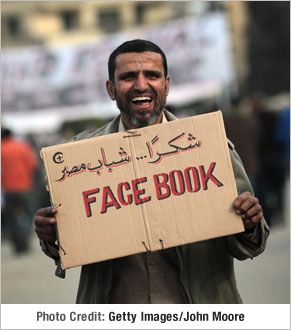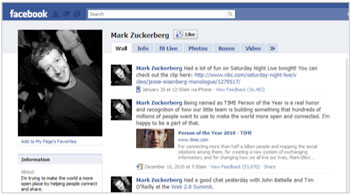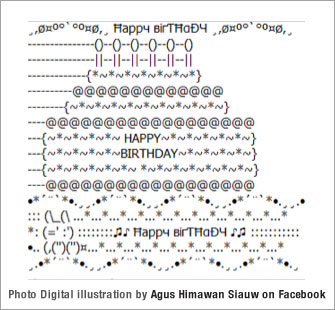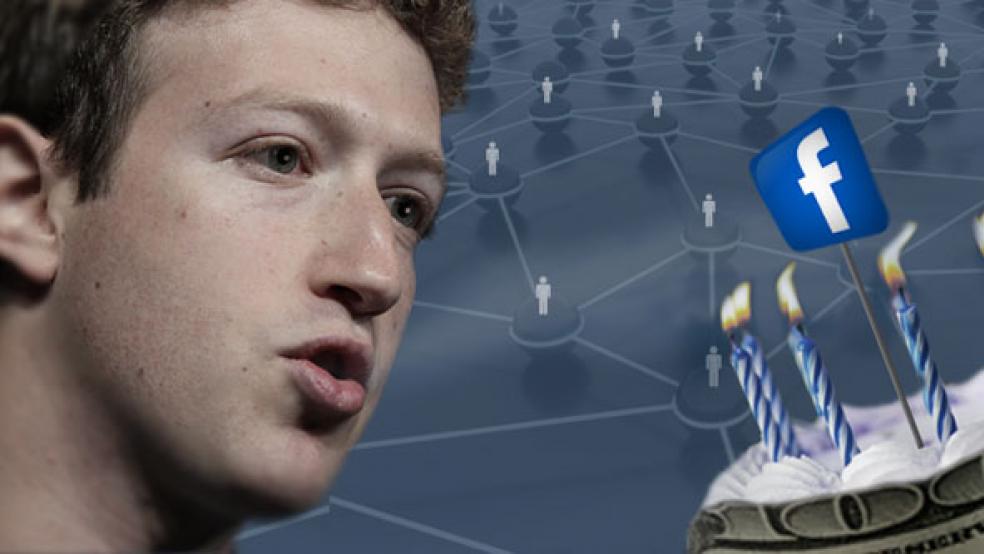If you wanted to give a seven year old the best birthday gift ever, you couldn’t do better than have hundreds of thousands people thank you for, well, just being you. That’s one of the take aways from the protests in Egypt this week.

As Facebook celebrates its seventh birthday this weekend, its fresh-faced CEO and co-founder, Mark Zuckerberg, now a rock star, is the youngest self-made paper billionaire in U.S. history.
Facebook is now valued at some $50 billion and Zuckerberg is estimated to be personally worth $14 billion. Not everyone, however, is as enthusiastic about Facebook as the Goldman deal would suggest. One former Goldman partner told the Wall Street Journal a month ago that he turned down the chance to buy shares in Facebook because he felt the $50 billion valuation was far too high. "Google's trading at seven times sale. I'm not going to buy Facebook at 25 or 50 times sales," he told the Journal. Facebook is also facing criticism for alleged privacy violations and for changing the site's design which some users preferred.
A few weeks ago, Facebook got a few early birthday gifts--a $500 million investment from Goldman Sachs and Digital Sky Technologies; the promise of an IPO in the coming year or so; and Mark Zuckerberg’s surprise hit appearance on “Saturday Night Live” last weekend, which so far has garnered more than 14,000 views on YouTube. Oh, and did we mention “The Social Network,” which won four Golden Globes and is nominated for eight Oscars, including Best Picture?
media, business structures, how we relate.”
Hands down, Facebook is now the largest site on the web, beating out Google and boasting more than 600 million users worldwide (five million in Egypt alone). It’s where millions of Americans, young and old, well-to-do or barely scraping by, start and end their days. It’s also where companies increasingly target their marketing and advertising programs.
Just eight years ago, Mark Zuckerberg was just another bright Harvard undergrad trying to navigate the social world on campus. Today, you can’t get him on the phone unless you’re Oprah, “60 Minutes,” “Saturday Night Live,” or New York City Mayor Michael Bloomberg, who this past week giddily announced that he’s enlisted Zuckerberg’s help in developing a major web presence for the Big Apple.
Says David Kirkpatrick, author of The Facebook Effect, an authorized account of the company’s history, “In mid 2008, I was routinely asked why I would write about this silly topic. To most adults, Facebook seemed a fad, a waste of time, a silly diversion.” Welcome to 2011.

The site, he says, “is now the center of the dialogue about American and global popular culture, social evolution, and business. The movie premiered in the fall to spectacular reviews, and for the first time the entire world knew who Mark Zuckerberg was.” Add Time magazine’s choice of Zuckerberg as 2010 Person of the Year and the Goldman Sachs valuation, says Kirkpatrick, and “no longer could any self-respecting adult claim that this was merely a fad or just another evanescent technology. Facebook has become accepted as one of the cornerstones of the Internet, and the idea that it could have a range of significant ‘effects’ is no longer controversial. It’s changing politics, marketing, media, business structures, how we relate, how we define friendship, our notions of privacy. That’s a lot of effects for a company once thought silly.”
Ben Mezrich, whose book The Accidental Billionaires was the basis for the hit film, says, “I think it’s a company that has changed the world. It’s an integral part of our lives. As it migrates into the iPhone, the iPad and more, it will only go in one direction.”
Which is exactly what some of today’s major corporations—as well as small businesses and many other organizations—are counting on.
The Place for Business
According to a new study from Experian Hitwise, an online measurement service provider, between January and November of 2010, Facebook grabbed 8.9 percent of all U.S. visits. (Google ranked second, with about 7.2 percent of all visits.) The typical session on Facebook is over 23 minutes long (on Twitter it’s 13 minutes) Add in the “like” feature on Facebook, and with the mere click of a mouse, a “like” by any of the site’s 600 million users can become ads aimed at friends, family and influential others. The Coca-Cola Company, among others, is already a sponsor of this program.
Marketing today, says experts like Jason Saul, author of Social Innovation, Inc., “has been replaced by what I call ‘emotive customer bonding.’ Consumers want a deeper connection to brands, and brands want that too. Facebook allows that connection to be forged by engaging with consumers personally, through a social platform.”
As far back as December 2008, consumer goods giant Kraft launched a cause-related Facebook campaign allowing users to donate meals to needy families during the holidays. In less than two weeks, 25,000 Facebook users added the application to their pages, translating into some 1.4 million donated meals. Now, according to Saul, “companies are trying to go one step further “in forging bonds with customers.
Consider the program launched this month with Facebook by the Ford Motor Company and Gogo Inflight, the wireless WiFi network provider. Aboard seven airlines—including United, Delta, and American Airlines—consumers can enjoy free access to Facebook for the month of February, instead of a fee-for-service arrangement that costs anywhere from $4.95 to three times that, depending on the length of the flight or other factors.
“By far the most frequented website by consumers while they fly is Facebook, where they chat with friends from 30,000 feet,” says Ash El Difrawi, chief marketing officer of Gogo. “We saw a lot of opportunities to partner with Facebook. And one of our advertising partners, Ford, got excited about this and said, ‘Why don’t you let us sponsor this?’”
El Difrawi says his company had been talking with Facebook for some time about “unique” consumer opportunities. “This is probably just the beginning. As we do bigger and bigger deals with Facebook, you’re going to see more innovative partnerships.”
Ford, for its part, says it’s been working with Facebook for several years “to try to find the right way to interact with the Facebook community,” according to Alex Hultgren, digital media manager for Ford Lincoln in Detroit. “We want to be welcome in the social media space, but not intrusive.” The company successfully launched its new Ford Explorer in July 2010 exclusively on Facebook, explains Hultgren—and not at a major auto show in New York or Detroit. It was a first for the automaker. “The main platform for consumers to interact with the Explorer was on Facebook, which was absolutely the right place. It’s all part of the continued evolution of how we use social media moving forward.”
Says El Difrawi of Gogo Inflight says, “Most people now go onto Facebook multiple times a day. I’m willing to bet—and I’ve seen this anecdotally—that a lot of business travelers are saying, ‘There’s no way I’m going to fly from San Francisco to New York and not be connected.’”
Just a few short years ago, a Facebook strategy wasn’t even a glimmer in the eye of most businesses. In 2001, says El Difrawi, “if you haven’t invested your money, you’re going to fall behind. No longer is this just about social networking. It’s about, how can we use this platform to drive business and to recruit talent? People are starting to run their entire businesses on Facebook.”
That’s one way to say Happy Birthday to Facebook and its founder, Mark Zuckerberg.

Digital illustration by Agus Himawan Siauw on Facebook
Related Links:
Facebook Turns Seven (WebProNews)
Facebook at Seven: The Business Case (ItPro: Fit for Business)





